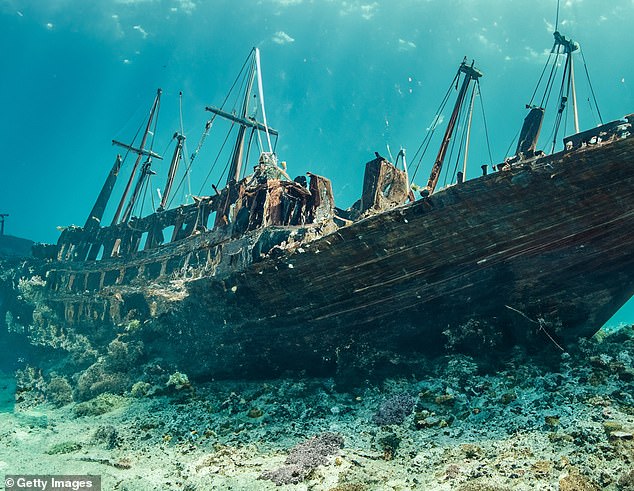Table of Contents
The quest to return more than £300bn of silver and gold currently lying on the ocean floor to British coffers has begun.
Leading the pack are bold hedge fund managers and City financiers with money to burn and a taste for adventure.
They include Spectator owner Paul Marshall, the fund manager who founded Argentum Exploration (a specialist salvage company), and Philip Reid, a former Merrill Lynch banker and chairman of rival exploration company Britannia’s Gold.
They are both financiers, but it is their passion for finding lost British treasures that unites them.
Expeditions are a rich man’s game: long, expensive, and with no guarantee of finding loot. But, as with many adventurers before them, the possibility of discovery is too powerful a reward.
Sunken Treasure: The search is on to return to British coffers more than £300bn of silver and gold currently lying at the bottom of the ocean
The prize money can be lucrative, but the expeditions also have a sense of patriotism that recalls the days when British explorers ruled the seas.
Reid told the Mail on Sunday: “I’m determined to be the man who went and brought Britain’s gold back.”
So what are you looking for?
During both World Wars, shipments of gold and silver were sent to America to pay for goods and munitions, but were often sunk by German submarines.
Many were sunk by submarines lurking in shallow waters off the coast of Ireland in an attempt to hamper the UK’s ability to import and export.
The rate of attrition was so high that Lloyd’s of London refused to insure the ships, meaning they were insured by the British government, which technically still owns the treasure.
Research shows that 7,500 ships carrying around £300bn in today’s money were lost.
For eight-year-old Britannia’s Gold, 2025 could be a pivotal year. It is targeting an unnamed wreck off the northwest coast of Ireland, where it has completed four phases of research. The company hopes to extract the cargo early next year.
Marine operations manager Will Carrier said crews face practical challenges such as “cutting eight inches of steel in total darkness.”
If the expedition is successful, the loot will be taken to a safe place and the company will negotiate a price with the UK government for its return.
Once costs are covered, profits will be distributed among investors.
Reid says the funding is coming from “big investors who can afford the considerable cost of the rescue”, such as family offices, sovereign wealth funds, institutional investors and hedge funds. “It’s basically backed by very rich people who think it’s fun. It’s a big draw for the average investor, but with all due respect, they’re not the ones we want,” he explains. “It’s increasingly seen as an attractive way to find gold that would cost a fortune to find on land, but getting it right and being successful is not easy.”
One of the main problems is that when loot is found, it is not always clear who owns it, as Marshall discovered.

Adventurer: Paul Marshall
He is the head of one of the world’s largest hedge funds, Marshall Wace, which manages £50bn in assets, and owns a large stake in broadcaster GB News.
Last week it bought the Spectator magazine for £100m, completing the next stage of its ambition to control a large part of the UK’s conservative and right-wing media. It remains in the running to buy The Daily and Sunday Telegraph, with the second round of bids due on 27 September.
But along with hedge fund partner Anthony Clake, Marshall is also a major financier of deepwater treasure hunts. According to company filings, Marshall controls Argentum Exploration, which was formed in 2012.
He thought he had struck gold in 2017 when Argentum recovered 2,364 silver bars from the wreck of the passenger ship SS Tilawa.
The ship was sunk in 1942 on its way to South Africa by a Japanese submarine, killing 280 people, and remained there for seven decades. However, after it was found, the company spent seven years in dispute with the South African government, arguing that it was owed a significant ransom.
In May, the British Supreme Court ruled in Pretoria’s favour, stating that it did not owe Marshall payment for the silver, which South Africa had purchased from the Indian government in 1942. The parties reached an agreement independently.
Clake, who has been involved in about 30 rescues, said earlier this year: “I don’t do this for a living.”
DIY INVESTMENT PLATFORMS

AJ Bell

AJ Bell
Easy investment and ready-to-use portfolios

Hargreaves Lansdown

Hargreaves Lansdown
Free investment ideas and fund trading

interactive investor

interactive investor
Flat rate investing from £4.99 per month

Saxo

Saxo
Get £200 back in trading commissions

Trade 212

Trade 212
Free treatment and no commissions per account
Affiliate links: If you purchase a product This is Money may earn a commission. These offers are chosen by our editorial team as we believe they are worth highlighting. This does not affect our editorial independence.
Some links in this article may be affiliate links. If you click on them we may earn a small commission. This helps us fund This Is Money and keep it free to use. We do not write articles to promote products. We do not allow any commercial relationships to affect our editorial independence.

